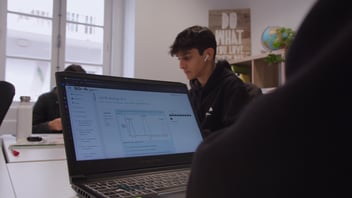In today's digital age, social media has permeated every aspect of a Learner’s life, shaping their interactions, perceptions, and aspirations. While hailed as a catalyst for innovation and connectivity, its omnipresence also harbours a host of challenges, ranging from mental health concerns to academic distractions. Understanding the positive and negative impacts of social media is imperative for a balanced digital habitat for Learners.
Positive Impacts
- Social media platforms serve as virtual gathering spaces, transcending geographical boundaries and embracing diverse communities. For Learners, these networks facilitate peer interactions, enabling them to forge meaningful connections with like-minded individuals, irrespective of physical proximity and cultural or social diversity. Research indicates that such social bonds can contribute positively to adolescents' emotional well-being and support as well as aiding in a sense of belonging.
- Beyond its recreational uses, social media encompasses a trove of educational resources. Platforms like YouTube, Khan Academy, and educational blogs offer Learners access to a plethora of learning materials, spanning a multitude of subjects and learning styles. From instructional videos to interactive quizzes, these digital resources complement traditional pedagogical approaches, enriching learning experiences and catering to individualised learning needs.
- Social media empowers Learners to unleash their creativity and express themselves through various mediums, be it photography, videography, or writing. Platforms like Instagram, TikTok, and Tumblr provide avenues for self-expression, allowing Learners to showcase their talents (especially utilising creative apps to do so) and perspectives to a global audience. This creative outlet not only cultivates digital literacy skills, but also harnesses self-confidence and self-discovery among Learners.
- In an increasingly competitive job market, social media serves as a vital tool for Learners to network and explore career opportunities. Platforms like LinkedIn enable Learners to showcase academic achievements, skills, and extracurricular activities to potential employers and mentors. Moreover, professional groups and forums facilitate knowledge sharing and mentorship, empowering Learners to navigate their career trajectories effectively.
Negative Impacts
- While social media offers numerous benefits, its influence has been associated with various mental health challenges among Learners. The constant pressure to create an idealised online persona, coupled with the tendency to compare oneself to others, often contributes to feelings of inadequacy, anxiety, and depression. Research suggests a correlation between excessive social media usage and adverse mental health outcomes, particularly amongst adolescents.
- The anonymity which social media platforms provide can embolden individuals to engage in cyberbullying and online harassment, targeting vulnerable Learners. The viral nature of content amplifies the impact of such negative interactions, resulting in a cycle of humiliation and victimisation. Cyberbullying not only erodes Learners' self-esteem and mental well-being, but could also impair their academic performance and social relationships.
- The addictive nature and design of social media poses a significant threat to Learners' academic success, often serving as a potent distraction from learning. The constant barrage of notifications and the temptation to scroll can impede concentration and cognitive function, leading to procrastination and decreased productivity. Studies indicate a negative correlation between excessive social media use and academic performance, highlighting the need for digital self-regulation strategies.
- In an era of pervasive online surveillance, Learners' digital footprints are increasingly scrutinised by educational institutions, employers, and even government agencies. Oversharing personal information and engaging in risky online behaviours can have far-reaching consequences, jeopardising Learners' privacy and future prospects. Moreover, the commodification of personal data by social media companies raises ethical concerns regarding consent and data protection.
The impact of social media on Learners is a complex tapestry woven with threads of both opportunity and challenges. While social media fosters connectivity, learning, and self-expression, its unchecked usage can exact a toll on Learners' mental health, academic performance, and privacy. As stewards of digital literacy, educators and caregivers must equip Learners with the necessary skills and knowledge to navigate the digital landscape responsibly. By promoting a culture of digital citizenship and mindfulness in social media consumption, we can harness its positive potential while mitigating its adverse effects on Learners' well-being.


.jpg?width=352&name=gabrielle-henderson-RZgDCQA1g60-unsplash%20(1).jpg)

Leave a Comment